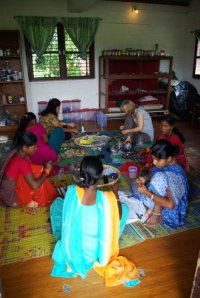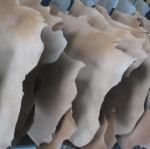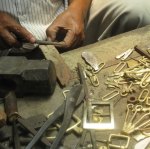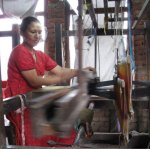Just over a year ago I visited Nepal with local fashion designer and friend Laura Queening. Laura set up the fair trade fashion label Aura Que in 2008. L-AuraQue-ening. Get it?
I’ve known Laura since school but I knew very little of her business trips to Asia other than that they involved her being abroad for three months and returning with a good tan. When I showed an interest in travelling out to see her, with free accommodation and Laura’s local knowledge thrown into the deal, I decided that a trip to Kathmandu to find out more was in order! Whilst there, I biked round the suburbs of Kathmandu visiting different suppliers and learnt more about how the Aura Que business operates. It became clear how the sketches Laura had been working on during bus and plane journeys transformed themselves, like pieces of a jigsaw, into the finished product.
Following her experience teaching English in a Nepali village, Laura chose to set up business in Nepal to support fair employment for local people, and it was clear on my visit that Aura Que’s ethical priority is the people involved. The bags are manufactured at the Nepali Leprosy Trust (NLT) where I met many of the workers. Leprosy is a stigmatised disease associated with poverty, meaning those impaired or disabled by leprosy tend to be among the poorest of the poor. The NLT provides employment and opportunities for those affected.
Doing business in Nepal isn’t always straightforward. On my visit we were initially unable to enter the country for three days due to a national strike which shut all businesses and blocked all roads. For me, three days at a border hotel in northern India was a bit frustrating, but if you’re running an international fashion business with meetings, deadlines and stock orders, such a set back has far greater consequences. While we were stuck in a hotel waiting for the border to open, I asked Laura if this kind of thing annoyed her. “It’s just a part of working in Nepal” she said, and she’s right. Strikes are just one additional obstacle that Laura has overcome in setting up a successful fair trade fashion label outside the UK. Shipping stock, ensuring quality levels are maintained and sourcing materials ethically in a culturally different environment has, as Laura put it to me, ‘kept her on her toes’.
The NLT’s manufacture is the final part of the production process. The materials themselves are sourced from small suppliers and individuals. Take the bag below for example
This is where it comes from… Leather – The leather is from buffalo like those we passed on the bus as we travelled through the lowlands of southern Nepal. We carried some with us on our journey overland from Delhi – from the tannery to the NLT…it was heavy. Banana fibre – What looks like wool on the front of the bag is actually banana fibre pruned from the root of the banana tree. I visited the place where they dye this fibre – a small dye plant at the back of a building. The issue Laura was having at the time was making sure they got the dye colours exactly right. It took Laura’s best Nepali, but she got there! Brass fittings – Brass fittings are made by hand by a local man, Mr Rizal, whom I met. He was sitting outside his family’s house in a little self-constructed workshop area moulding the metal with his hammer when we arrived.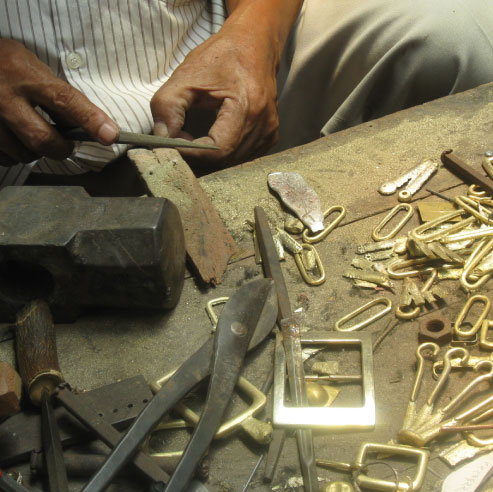
Laura puts together high quality fashion products while maintaining a direct and personal link with the people involved in every aspect of each bag’s production. I was fortunate enough to get to meet the people that are being supported by Aura Que, but to find out about more without making the trip to Asia, take a look at the website http://www.auraque.com / or pop into The Fair Traders Co-operativethe Fairtrade shop where Aura Que bags are on display. You can also buy Aura Que bags online via The Fair Traders Co-operative at www.thefairtraderscooperative.co.uk.
Thank you to member Nick Batty for this post.


